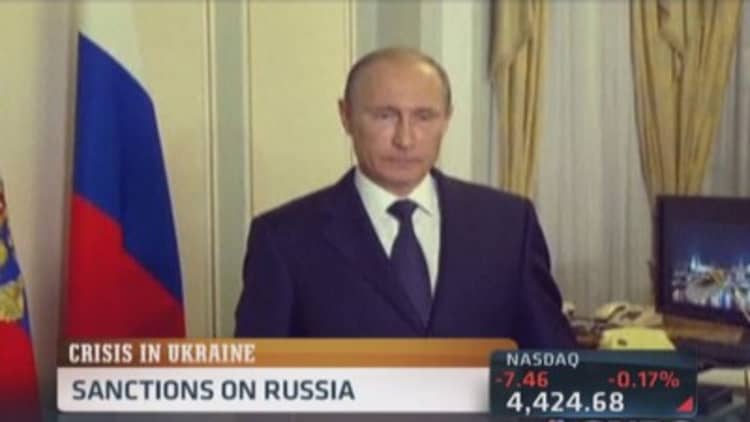The downing of Malaysia Airlines Flight MH17 has renewed calls to punish Russia's billionaire oligarchs and the Putin money machine.
But just as with previous sanctions, the latest round is unlikely to put much of a dent in their Swiss bank accounts or global fortunes.
The U.S. and Europe are gearing up for a new round of sanctions expected to be announced this week that will impose travel bans and business sanctions against several Russian billionaires with ties to Russian President Vladimir Putin. In a phone call last night, British Prime Minister David Cameron told Putin that his "cronies" will face sanctions unless Russia withdraws its support for the separatists in Ukraine.

While current sanctions target several billionaires close to Putin—including oil-trader Gennady Timchenko, Rosneft executive Igor Sechin and financier Yuri Kovalchuk—the new round would presumably cast a wider net. According to Russian experts, the new round could restrict travel and capital to a larger number of billionaires and Russian companies that have supported Russia's involvement in Ukraine.
Read MoreObama presses Putin on MH17 downing probe
Some foreign policy experts say energy giant Gazprom and executive Alexey Miller could face sanctions along with other parts of the energy sector. Several officials in the U.S. and Britain are also pushing for sanctions against billionaires who "influence or support" the Putin regime, though that's less likely.
The oligarchs, it seems, are bracing for the worst. Russia's business elite is "in horror" over the looming punishments," Igor Bunin, the head of the Center for Political Technologies in Moscow, told Bloomberg. He said they are afraid to speak out for fear of punishment. "Any sign of rebellion and they'll be brought to their knees."
Yet despite the political bluster and "horror" talk, Russia's richest men are unlikely to feel much pain. That's because Russia's richest men won't be targeted. And many of the rest of the Russian elite have already stashed much of their fortunes overseas, where they are safe from any sanctions.
Read MoreRich Russians flock to UK for multimillion art sale
Russia's top billionaires—like media mogul Alisher Usmanov (worth more than $18 billion) or Alfa Group co-owner Mikhail Fridman (worth about $17 billion) or Renova Group's Viktor Vekselberg—may have previous or current ties to Putin. But it's not likely that the West can prove they were involved in Ukraine.
"You can't just target someone because they are a Russian worth 10 figures," said a European policy expert. "The aim here is to target people who supported this military campaign."
In addition, the Russian rich have been rapidly moving money overseas in anticipation of just such a political crisis. At least $75 billion left Russia in the first half of the year, more than the $62.7 billion that left the country in all of 2013, according to Russia's central bank.
The moves come despite Putin's calls for Russian businessmen to be more "patriotic" and keep capital in Russia.
Some of that money has come to the U.S., buying up penthouses in Manhattan, mansions in Miami and (increasingly) commercial real estate in major cities. Russians were among the top 10 foreign buyers of real estate in 2013, according to the National Association of Realtors, though they are more concentrated at the high end of the market.
Read MoreMiami mansion boom rages on
Edward A. Mermelstein, a New York attorney who works with wealthy Russian clients on real estate and business deals, said Russian buyers took a brief pause in the beginning of the year. But business has since bounced back.
"We saw things slow down early in the first quarter, but then all of the sudden the business came back aggressively," he said.
Mermelstein said his clients are not the high-profile oligarchs with close ties to Putin. He said most are entrepreneurs with lesser wealth (though still millionaires) who long ago started diversifying their businesses overseas and are now moving more capital into the U.S.
Read MoreForeign buyers snatch up US homes at record pace
"There is a large class of affluent Russians with no connection to the government and that you've never heard of," he said. "Some of them now have more businesses and investments in the U.S. than in Russia."
Even after the Malaysia Airlines crash and discussion of more sanctions, he said, Russian buyers are still active.
"We haven't seen any significant changes whatsoever," he said.
—By CNBC's Robert Frank.


